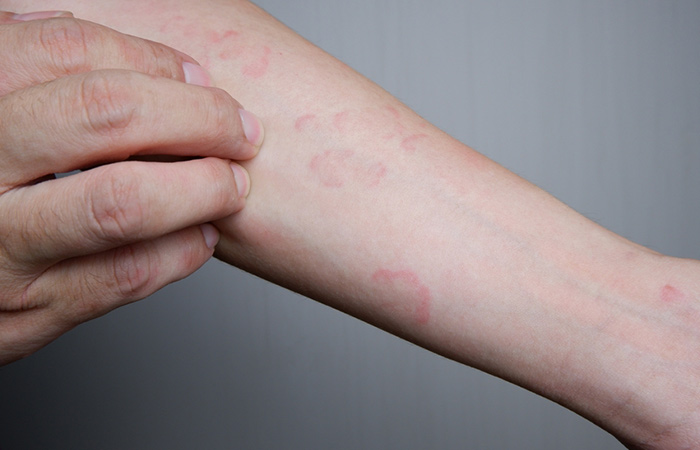Mushroom allergies are relatively rare, but they can cause a range of symptoms including skin reactions, gastrointestinal distress, and respiratory problems. Some people may also experience anaphylaxis, a potentially life-threatening reaction. If you suspect you have a mushroom allergy, it’s important to see an allergist for testing and treatment.
If you’re one of the unlucky few who are allergic to mushrooms, the symptoms can range from mild to severe. Here’s what you need to know about mushroom allergies and how to avoid them.
Mushroom allergies are relatively rare, but they can cause a range of symptoms from mild to severe.
The most common symptom is an itchy or tingling feeling in the mouth, followed by hives, swelling, and difficulty breathing. In some cases, mushroom allergies can even lead to anaphylaxis, which is a life-threatening reaction.
If you think you might be allergic to mushrooms, it’s important to see a doctor so they can confirm the diagnosis and help you create a plan to avoid future reactions.
There are also a few things you can do at home to reduce your risk of having a reaction, such as avoiding cooked mushrooms and only eating mushrooms that have been washed thoroughly.
Do You Know Everything (Symptoms and Treatments) About Mushroom Allergy?
Sudden Mushroom Intolerance
If you’ve been eating mushrooms without any problems, it can be a shock to suddenly find yourself unable to tolerate them. This sudden mushroom intolerance can be caused by many things, ranging from a change in your diet to a more serious underlying condition. Here’s what you need to know about this problem and how to deal with it.
There are two main types of mushroom intolerance: those caused by an allergy, and those caused by a sensitivity or intolerance. Mushroom allergies are relatively rare, but they can be severe and even life-threatening. If you suspect you may be allergic to mushrooms, it’s important to see a doctor right away for testing and treatment.
Sensitivity or intolerance to mushrooms is much more common, and usually not as serious as an allergy. However, it can still cause uncomfortable symptoms like abdominal pain, diarrhea, and vomiting. If you’re having these sorts of symptoms after eating mushrooms, it’s best to avoid them until you can speak with a doctor or allergist about your specific situation.
If you have mushroom intolerance, there are some steps you can take to make sure you don’t have any reactions when eating out or cooking at home.
Mushroom Allergy Home Remedy
If you’re one of the unlucky few who suffer from mushroom allergies, there’s no need to despair. There are a number of home remedies that can help you manage your symptoms and avoid reactions.
One simple and effective home remedy is to take a daily antihistamine.
This will help to reduce your overall allergy symptoms and make it less likely that you’ll have a reaction to mushrooms.
Another helpful tip is to avoid eating raw mushrooms. Cooking them first will help to break down the proteins that cause allergic reactions.
So, if you’re planning on using mushrooms in a recipe, be sure to cook them thoroughly before adding them in.
If you do happen to have a reaction after eating mushrooms, it’s important to act quickly. Taking an over-the-counter antihistamine such as Benadryl can help lessen the severity of your symptoms and prevent them from getting worse.
It’s also a good idea to drink plenty of fluids and get rest if you can – this will help your body recover from the reaction more quickly.
Mushroom Allergy Treatment
Mushroom allergies are not as common as other food allergies, but they can be just as serious. If you have a mushroom allergy, it’s important to know what treatments are available to help you manage your condition and avoid potentially life-threatening reactions.
There is no cure for mushroom allergy, but avoidance is the best way to prevent reactions.
If you accidentally eat a food that contains mushrooms, over-the-counter or prescription medications can help relieve symptoms. In severe cases, epinephrine (adrenaline) may be necessary to treat a reaction.
If you have a mushroom allergy, work with your doctor to create an action plan that includes emergency treatment instructions.
Be sure to carry your medication with you at all times in case of accidental exposure. With proper management, people with mushroom allergies can live normal and healthy lives.
How Long Does Mushroom Allergy Last
If you’re one of the unlucky few who are allergic to mushrooms, you may be wondering how long your allergy will last. Unfortunately, there is no simple answer to this question as everyone’s individual reaction can vary greatly in both severity and duration. In some cases, a mushroom allergy may only last for a few hours or days, while others may experience symptoms for weeks or even months after exposure.
The best way to avoid any uncomfortable reactions is to simply avoid eating mushrooms altogether. However, if you do accidentally eat something containing mushrooms (or come into contact with them in some other way), it’s important to know what symptoms to look out for and how to treat them accordingly. Common mushroom allergy symptoms include hives, itching, swelling, difficulty breathing, and gastrointestinal distress.
If you experience any of these after exposure to mushrooms, it’s important to seek medical attention immediately as some of these can be indicative of a more serious reaction known as anaphylaxis.
With proper avoidance and prompt treatment of symptoms, most people with mushroom allergies can lead relatively normal lives without too much disruption. However, it’s always important to be aware of your individual risk factors and take steps to stay safe!
Mushroom Allergy Common
If you’re one of the many people who suffer from allergies, you may be wondering if you’re allergic to mushrooms. Though not as common as other allergies, mushroom allergies are still relatively prevalent, affecting about 1% of the population.
Symptoms of a mushroom allergy are similar to those of other allergies and can include itching, swelling, hives, and difficulty breathing.
In severe cases, anaphylaxis can occur. If you experience any of these symptoms after eating mushrooms or coming into contact with them, it’s important to see a doctor for proper diagnosis and treatment.
There is no cure for a mushroom allergy, but avoidance is the best way to prevent reactions.
This means being careful when selecting mushrooms at the grocery store or farmer’s market, and avoiding restaurants that use them in their dishes. If you must eat mushrooms or be around them, always carry your emergency medication with you in case of a reaction.
Mushroom Intolerance
If you have a mushroom intolerance, it means that your body can’t properly digest mushrooms. This can lead to some uncomfortable symptoms like bloating, gas, and diarrhea. In severe cases, it can even cause anaphylactic shock.
If you think you might have a mushroom intolerance, the best thing to do is to avoid eating mushrooms altogether. However, if you do eat them, be sure to cook them thoroughly first. This will help to break down the compounds in mushrooms that your body can’t tolerate.
Mushroom Allergy Skin Rash
Mushroom allergies are not as common as other food allergies, but they can still cause serious reactions in some people. Symptoms of a mushroom allergy can include itching, swelling, and redness of the skin, as well as difficulty breathing and gastrointestinal problems. In severe cases, anaphylaxis may occur.
If you suspect that you or your child may have a mushroom allergy, it is important to see an allergist for proper diagnosis and treatment. Treatment for a mushroom allergy typically includes avoidance of mushrooms and/or use of antihistamines and epinephrine (in the case of anaphylaxis).
Mushroom Allergy Foods to Avoid
Mushroom allergies are not as common as other food allergies, but they can be just as dangerous. If you have a mushroom allergy, it is important to know which foods to avoid.
Most people who are allergic to mushrooms are actually allergic to a specific type of mushroom.
The most common type of mushroom that people are allergic to is the white button mushroom. Other types of mushrooms that can cause an allergic reaction include oyster mushrooms, shitake mushrooms, and enoki mushrooms.
If you have a mushroom allergy, you should avoid all types of mushrooms.
This includes cooked mushrooms and products that contain Mushroom Allergens like: canned soups or sauces, pizza toppings, salad dressings, and stuffing mixes. You should also check labels on processed foods carefully since some may contain small amounts of mushroom allergens.

Credit: www.stylecraze.com
What are the Symptoms of Mushroom Intolerance?
Mushroom intolerance is a condition where the body cannot properly digest mushrooms. This can lead to a number of different symptoms, including abdominal pain, bloating, gas, diarrhea, and vomiting. In some cases, people with mushroom intolerance may also experience hives or skin rash.
How Long Does a Mushroom Allergy Last?
There is no such thing as a “mushroom allergy.” While some people may have an intolerance to mushrooms, true allergies are rare. Intolerances are more common, and can cause symptoms like gas, bloating, and stomach cramps.
However, these symptoms are not life-threatening.
How Long Does It Take for Mushroom Allergy to Appear?
Mushroom allergy is relatively rare, but it can occur in people who are allergic to other fungi or moulds. The symptoms of mushroom allergy can vary from mild to severe, and usually appear within a few minutes to an hour after eating mushrooms. In severe cases, mushroom allergy can lead to anaphylaxis, which is a potentially life-threatening reaction.
If you think you may be allergic to mushrooms, it’s important to see a doctor for diagnosis and treatment.
How Do You Treat Mushroom Allergy?
There is no one definitive answer to this question as the treatment for mushroom allergy will vary depending on the individual’s severity of reaction and level of sensitivity. However, some general tips that may be helpful in managing mushroom allergy include:
– Avoiding mushrooms and anything containing them.
This may seem obvious, but it is important to read labels carefully and be aware that mushrooms can be found in many processed foods (e.g., soups, sauces, etc.).
– If you are accidentally exposed to mushrooms or come into contact with them, immediately wash the affected area with soap and water. For more severe reactions (e.g., difficulty breathing, swelling), call 911 or go to the nearest emergency room.
– Talk to your doctor about whether you should carry an epinephrine auto-injector (e.g., EpiPen) for emergency use in case of a severe reaction.
Conclusion
Mushroom allergies are not as common as other food allergies, but they can still cause serious symptoms. The most common symptom of a mushroom allergy is gastrointestinal distress, including nausea, vomiting, and diarrhea. Some people may also experience hives, itching, or swelling.
In severe cases, anaphylaxis can occur. This is a potentially life-threatening reaction that requires immediate medical attention. If you suspect you have a mushroom allergy, it is important to see an allergist for diagnosis and treatment.

